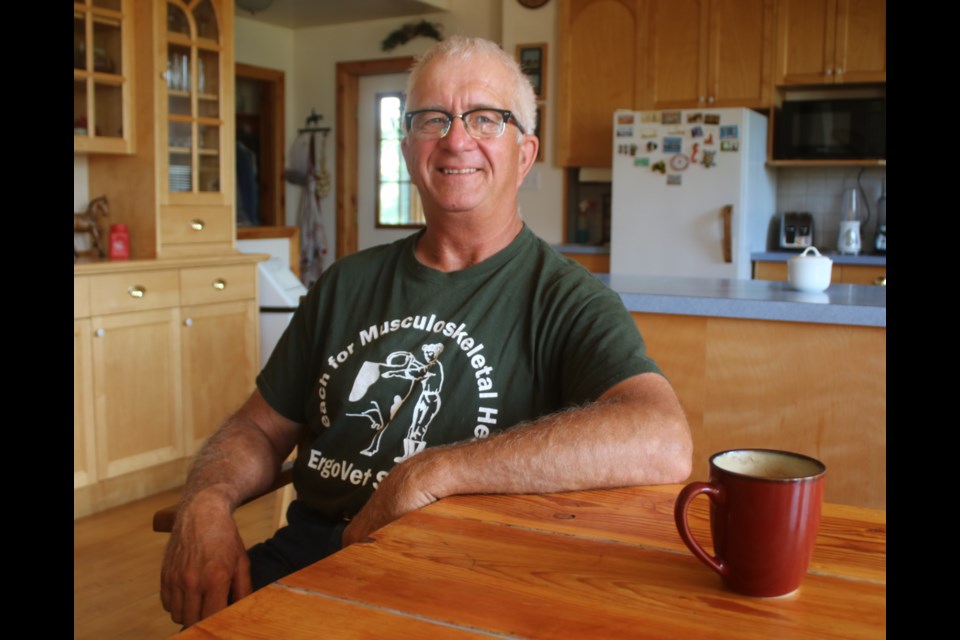The Yorkton area is losing one of its long-time large animal veterinarians.
Dr. Kenn Wood of Whitesand Veterinary has ended his practice as of July 1.
For Wood, the decision to retire ends a career he said he had planned to pursue since he was a young boy.
“I always wanted to be a cow vet,” he said.
Wood grew up in Yorkton, spending a lot of time as a youth at uncle Harvey’s farm, where there were cattle.
“He, (Harvey), was a real cattleman ... It was the best part of my childhood,” he said.
And soon the dream was set.
“I decided when I was 12-years old, (to become a veterinarian). I never strayed from that. There never was a plan ‘B’,” said Wood.
Wood would pursue his dream finally graduating from the University of Saskatchewan in 1977. He began his career in Prince Albert, but was soon in Yorkton in a partnership with Dr. Doug McDougall.
“Doug and I worked together 11-years,” said Wood, adding when he bought his farm west of Ebenezer the duo finally split, although it was an amicable parting of the ways with Wood’s new practice focusing on large animals.
“Doug was never fussy about large animals,” he said.
Wood on the other hand was just where he wanted to be, travelling the countryside treating ailing cattle and horses.
Typically Wood worked within a 50-mile radius of the practice, although there were calls from as far afield as “Wynyard, or even farther,” he noted.
Being an ambulatory veterinarian, travelling to the sick animals, rather than the animal being hauled to a clinic, meant thousands of kilometres travel for Wood. He said in the early years 70,000 kilometres a year was not uncommon.
But he never minded the road miles, although he did note automobile accidents do account for the most on the job deaths in the profession.
“I loved it. It’s the best job in the world,” he said.
Still, the demand to drive, work long hours, and deal with animals weighing hundreds of pounds mean the job is not an easy one.
“It’s physically demanding,” He said, adding with some chagrin “I just can’t do the midnight calls anymore.”
While always wanting to work with cattle, Wood said he ended up working with a lot of horses too.
“I became the horse guy here, but not by design,” he said.
Wood said even in college vet students tended to either love horses, or want little to do with them. In his case he never gave it a lot of thought.
“I rode as a kid. Growing up I liked horses, but I was not crazy about them,” he said.
But as a vet Wood said he found he worked with horses well, adding the secret was rather simple, applying the basic animal husbandry skills that work in general across all farm species.
It also helped to be aware of the horse’s situation.
Horses that are spoiled by humans can be an issue.
“The ones that have never had a human alpha figure in their lives ... those are the ones that will hurt you,” he said.
It helped that he was a pioneer in dog agility sport in Saskatchewan, and through that dog training, Wood developed skills that were useful as a vet with other species.
“I’m convinced working with dogs, training them at that time, made me a better practitioner,” he said. “The basics of critter training are the same no matter what you’re dealing with – the principles are the same.”
Of course Wood is all about critters, and the important relationship with people.
“Having critters around ... it makes you a better person,” he said. “Nancy said that to me a million years ago ... associating with critters makes you a better person.”
That is a change Wood said he has seen through the decades of his practice. In the early years everyone was still connected to the farm, largely mixed farms, meaning a direct connection to critters.
“Everybody in Saskatchewan hung around with critters. I didn’t know anybody who didn’t grow up with critters,” he said.
That has changed dramatically in recent years, he said, adding the connection to critters is increasingly missing for more and more people.
Wood will continue his relationship with critters in retirement, his two well trained blue heeler dogs, and a small herd of shorthorn cattle.
As for the veterinary business, he simply reiterated “I’m ready, (to retire),” adding many of his clients became more than that over the years, “These people are still my friends.”
��

.JPG;w=120;h=80;mode=crop)


